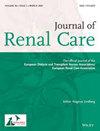Exploration of low-phosphate diet management of patients receiving renal dialysis: An interpretive description
Abstract
Background
Patients with dialysis-dependent kidney failure and treated for hyperphosphatemia receive a combination of dietary advice, phosphate binders and prolonged dialysis. However, research focusing on the challenges patients meet in everyday life addressing diet and medication is sparse.
Objective
The objective of this study is to explore the everyday challenges patients meet when following treatment for hyperphosphatemia.
Design
Interpretive description was the methodological approach. Semistructured in-depth interviews were employed to study the challenges patients experienced. Data were analysed using Braun and Clarke's reflexive thematic analysis.
Participants
Patients (n = 14) receiving haemodialysis and treated for hyperphosphatemia from two hospitals in Southern Denmark.
Findings
The analysis resulted in one over-arching theme; separation in social gatherings and two subthemes; a new social code, and my food and their food. Participants experienced difficulty integrating diet and medication in daily life, especially at social gatherings. They felt separated from others when special menus were provided for them or struggled when choosing between high and low phosphate-containing food. A new awareness of self and others arose, especially their position among families and friends, and how they presented themselves and their social identity to others. Likewise, a new social code manifested itself, which was difficult to accept. Most participants experienced that diet and medication were accompanied by a moral responsibility of whether to accept prepared food with high phosphorus content or not, which affected commensality.
Conclusion
Patients were often nonadherent to hyperphosphatemia treatment at social gatherings. Hyperphosphatemia treatment led to new social identities with new social codes, which patients found difficult to accept.

 求助内容:
求助内容: 应助结果提醒方式:
应助结果提醒方式:


